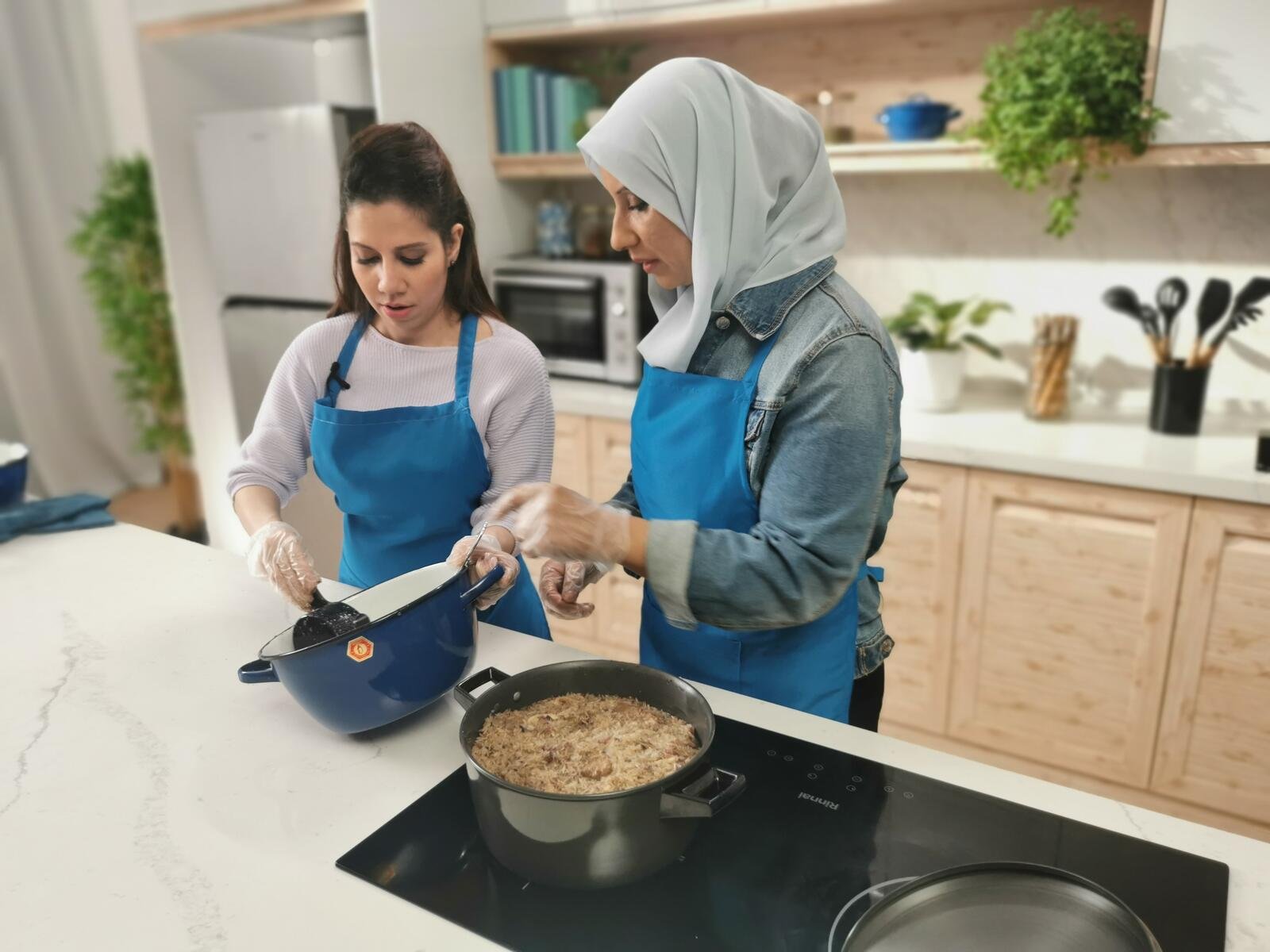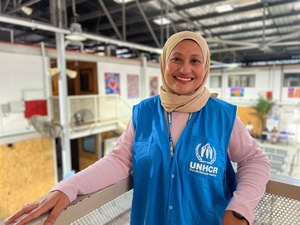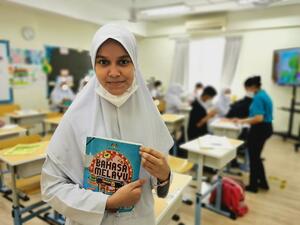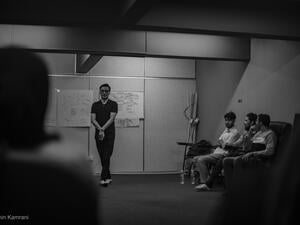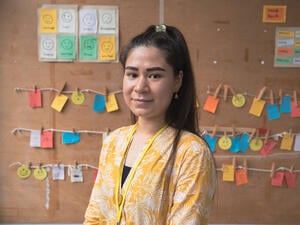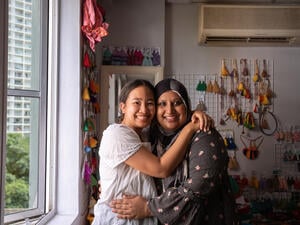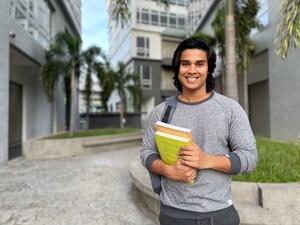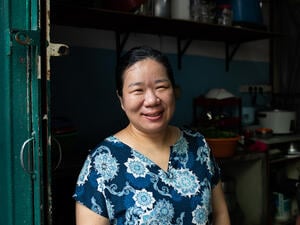Anis Nabilah and Dalya team up to cook Maqlooba
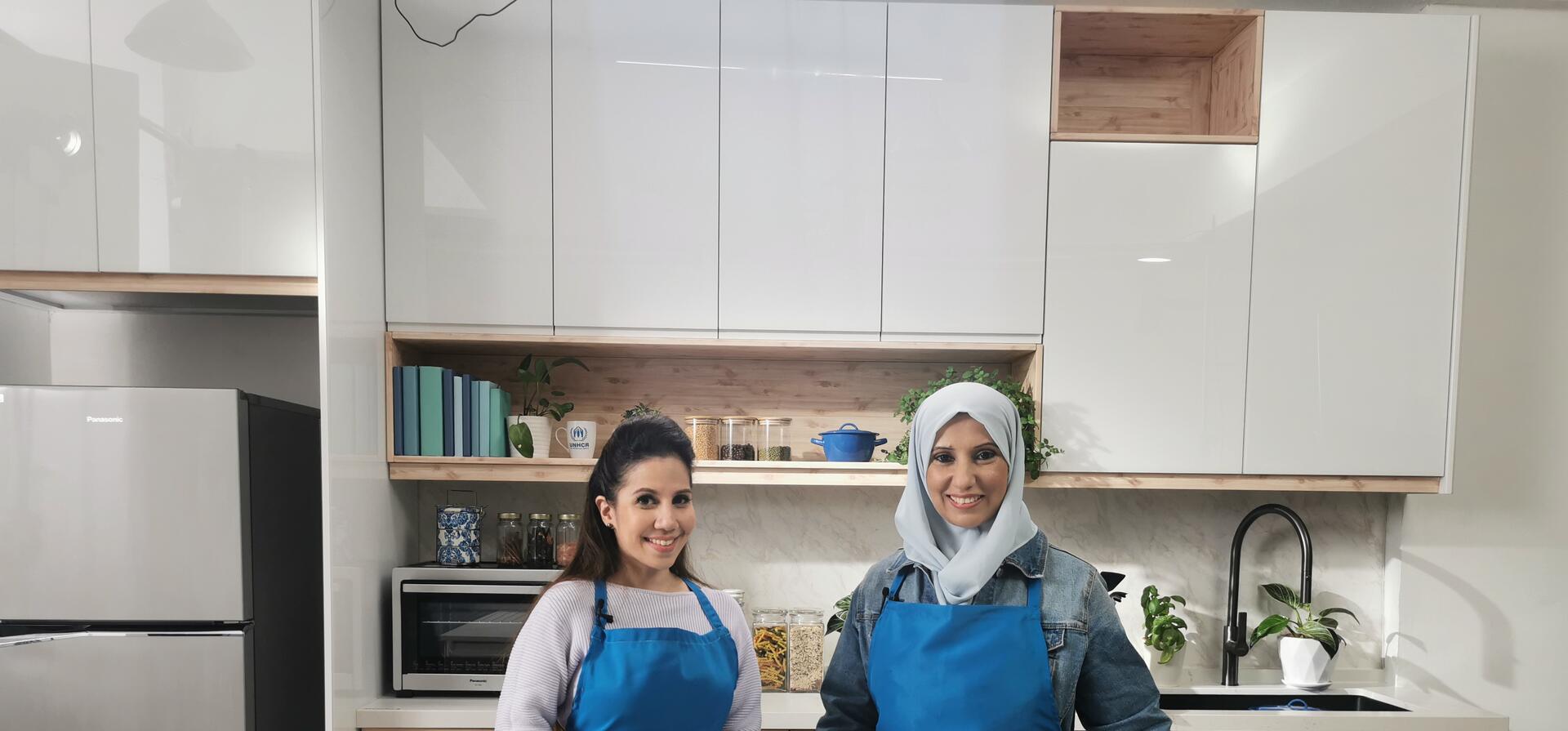
Anis Nabilah and Dalya team up to cook Maqlooba
To mark the holy month of Ramadan, UNHCR, the UN Refugee Agency, has released a cook-along video featuring celebrity chef and UNHCR supporter, Anis Nabilah and Palestinian home-cook Dalya.
In the video, Dalya takes Anis Nabilah through the steps in making ‘Maqlooba’, a dish meaning “upside down” in Arabic. It is a traditional Palestinian dish of richly spiced rice, vegetables, and stewed meat, layered and cooked, then flipped onto a serving dish to form an impressive tower.
As the two skilled chefs convivially cooked together in the kitchen studio, Dalya shared food memories from her life in Palestine before she and her family were forced to flee. 'Maqlooba’ is a dish for special occasions, like Eid and Ramadan. Cooking it brings the memory of home.
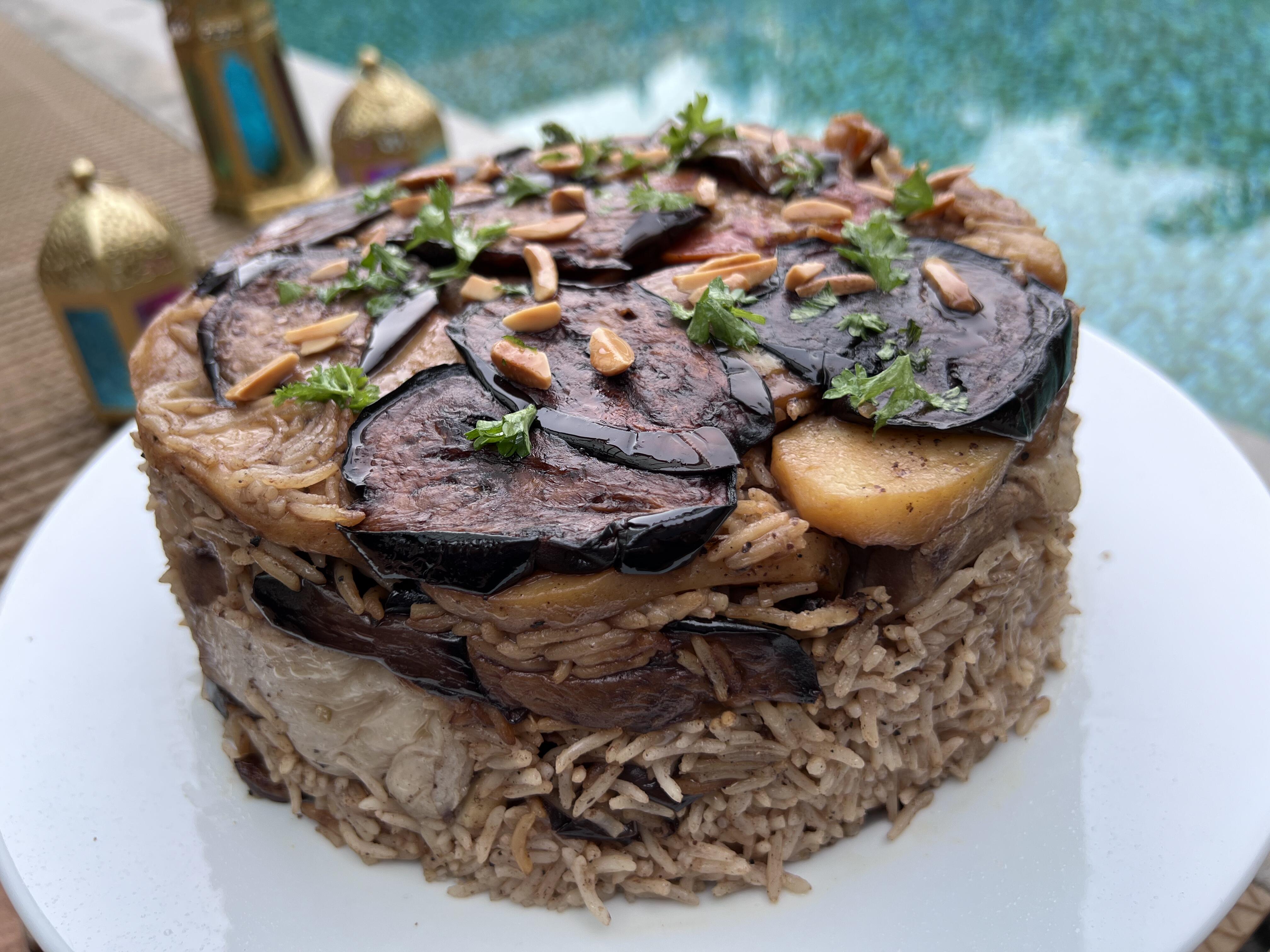
Maqlooba, a traditional Palestinian dish of richly spiced rice, vegetables, and stewed meat.
“I remember that it was raining on that day my mom taught me to make Maqlooba. I remember her sitting on a chair in the kitchen, giving me instructions. Now every time I cook Maqlooba, I remember my mother on that day and I am reminded of the smell of rain,” said Dalya.
Dalya, a trained accountant, was forced to flee the Gaza Strip in Palestine to Malaysia with her husband and four children, seven years ago. When they first arrived, Dalya’s husband, who was an engineer in Palestine, sold Shawarma to make ends meet. Dalya decided to contribute by making Maqlooba and Mandi rice. Word spread of her culinary skills, and now she cooks full time to support her family.
“Food is important to me because it helped to re-build my life in a new country. But it is also important because it helps me remember home. When I cook, I am reminded of the recipes my mother taught me,” said Dalya.
“When I left my country, my kids were still young. So usually when I cook a Palestinian dish, it reminds them about the food and our culture,” said Dalya. “I cook dishes from home so that there are opportunities for me to tell them stories of our beloved land. They love listening to these stories and often tell me how much they long to return to Palestine.”
Dalya spoke of her earliest experience in the kitchen, cooking fish for her father back home. Her mother, who disliked fish, had asked her father to buy anything but fish from the market.
“So of course, he brought home fish,” laughed Dalya. She offered to cook the fish for her father, and the first dish she ever cooked was a hit. Dalya has not looked back since.
“I love cooking so much, I can cook for 24 hours straight,” said Dalya. “As long as someone else does the cleaning and washing up!”
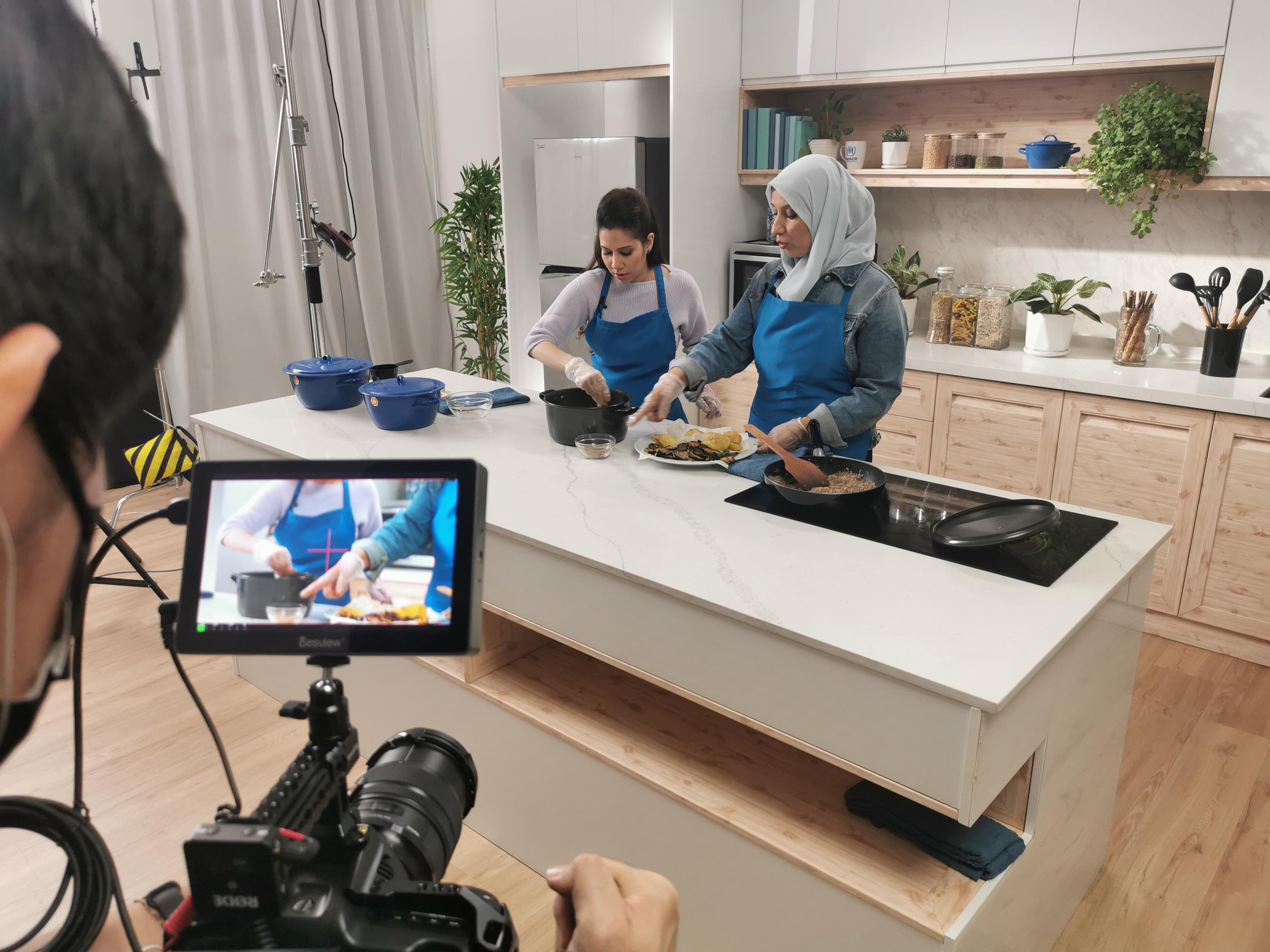
Anis Nabilah and Dalya team up to cook Maqlooba
Anis Nabilah is an international celebrity chef and media personality, helming numerous television shows like the perennial favourite Icip Icip and Eating Wild on the Asian Food Channel. Having started her culinary career at a very early age, she is now considered to be one of the most accomplished young celebrity chefs in the world. She was recently named Asean's Most Influential Chef at the 2022 Asean Food & Travel Awards.
For several years now, Anis has spent time volunteering with projects to help refugees in the country. Through a local NGO running a refugee education programme, she also taught refugee children to bake. When her busy schedule permits, Anis also volunteers to cook meals for refugees, especially during the fasting month of Ramadan.
“Cooking is a lot more than just work, it’s important to Dalya and me because it means so much more. It’s because we truly love cooking. We both agree that it brings families together, and that’s such a wonderful thing. I feel that we really connected through these values,” Anis added.
“I feel that a lot of Malaysians do not know the real situation about refugees. People think that refugees have a choice to come here, but that is not the case,” said Anis. “They came here to save their lives. And even when they are relatively safer here, they still face daily struggles to survive.
“If Malaysians took the effort to understand refugees better, they would feel more empathy and would not make blind assumptions towards this group,” adding that this was one of the reasons why she decided to participate in the UNHCR-produced cooking series.
“Refugees need help, but refugees can also help others,” said Dalya. “For instance, during the lockdown, I cooked about 300 meals for the frontliners working at the hospital. I also cooked many dishes to be distributed to the homeless community during the pandemic. I love to help and I want to share my talents with anyone who needs it.”
“Back in Palestine, the women will cook during Ramadhan and serve it to worshippers at Al-Aqsa mosque and other mosques during Ramadhan. We do this for free because Ramadhan is a holy month, where we give Sadaqah (voluntary charitable offerings). It is a tradition that I love to continue here, in the country hosting me, to show my appreciation,” said Dalya with a smile.
This cook-along video entitled “How to Cook Maqlooba with Anis Nabilah and Dalya” is a part of a series of cooking videos produced by UNHCR in collaboration with Malaysian celebrities.
There are some 180,000 refugees registered with UNHCR in Malaysia, having fled their countries due to war, persecution, and complex human rights abuses.
By highlighting the connection between food, family, memories and culture, UNHCR hopes to show that refugees are everyday people who have survived extraordinary circumstances and, like everyone else, they have hopes, dreams, and favourite foods that remind them of special times and places in their lives.
During this holy month, you can share the blessings and generosity of Ramadan with refugee families who are observing the holy month far from their homes and communities, faced with poverty, hardship, and uncertainty. Every Gift Counts for those most in need.
Share the blessings of Ramadan today
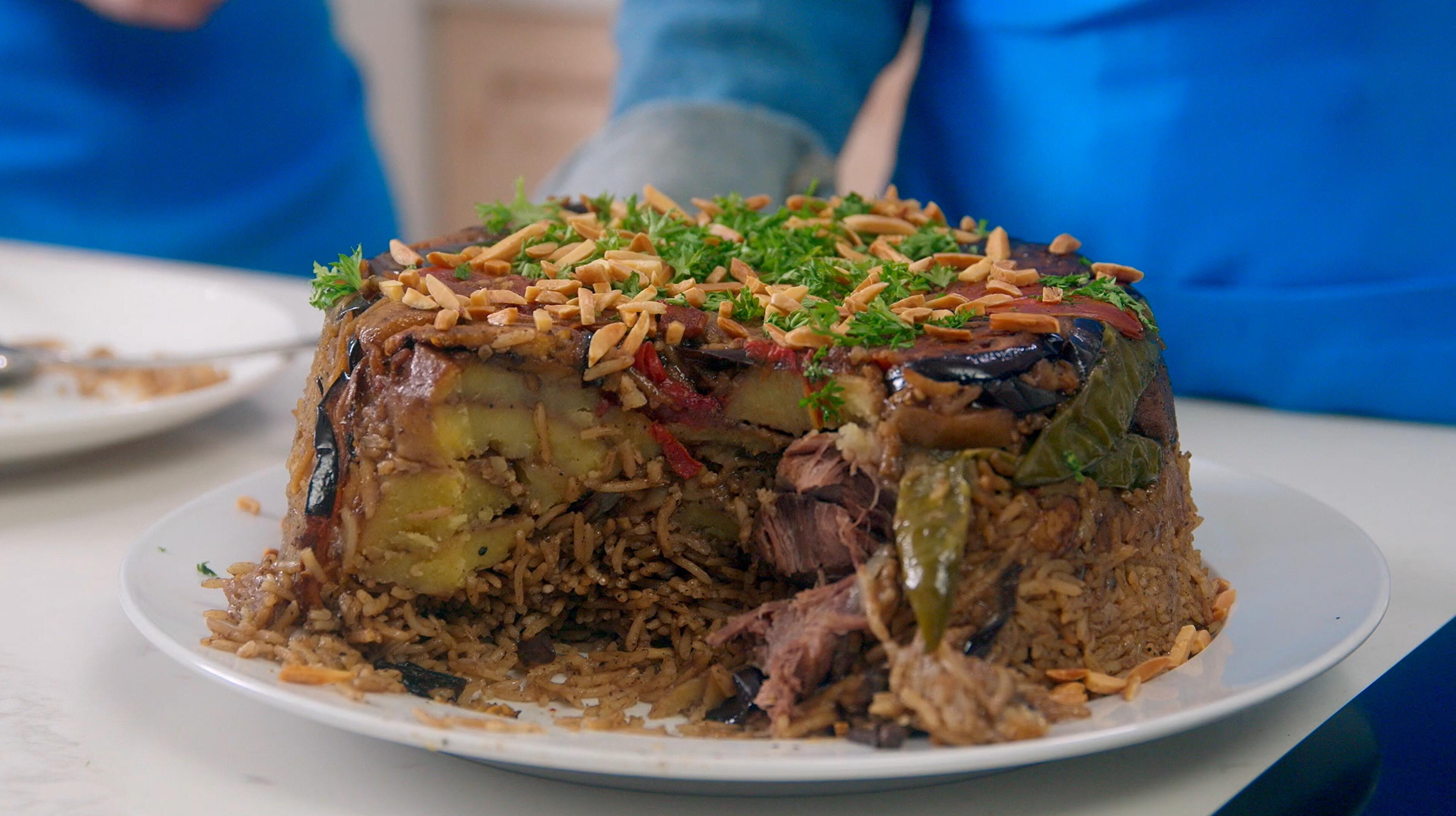
Maqlooba, a traditional Palestinian dish of richly spiced rice, vegetables, and stewed meat.
Recipe for Maqlooba
Ingredients
1kg lamb
4 cups of meat broth
4 cups basmathi rice
Oil
600g potatoes
700g eggplant
2-3 tomatoes
3-4 garlic cloves
2 green pepper
2 shallots
Spices for lamb
3 -4 Cardamom
3 Bay leaves
3-4 Cloves
3-4 Black pepper
1 onion
Spices for vegetable and rice
2 tsp salt
2 tsp sweet spices
1 tsp black pepper
1 tsp cinnamon
1 tsp cardamom
Garnishing
Parsley
Toasted almond slivers
Instructions
- Boil lamb with cubed onion and spices for 30 minutes until tender. Set aside 4 cups of broth.
- Heat oil. Once heated, shallow fry sliced potatoes and green chillies.
- Remove excess moisture from sliced eggplant before shallow frying by patting eggplant dry with paper towel. Then, shallow fry eggplant until golden brown.
- Set aside all potatoes, green chilies and eggplant.
- In the same pan, saute slices shallots and garlic until golden brown.
- Then, add in 4 cups of uncooked basmathi rice. Add in sweet spices, cinnamon powder, black pepper, cardamom powder and salt. Mix well.
- Start layering the ingredients in a large pot. Between each layer, sprinkle mixed spices. Layers are tomatoes, eggplants, potatoes, green chillies, lamb pieces and basmathi rice respectively.
- Pour in 4 cups of lamb broth.
- Cover the pot and cook on low heat for 40 minutes.
- After 40 minutes, turn the pot over on a plate and lift the pot up to serve the maqlooba.
- Garnish maqlooba with chopped parsley and toasted almond slivers.


